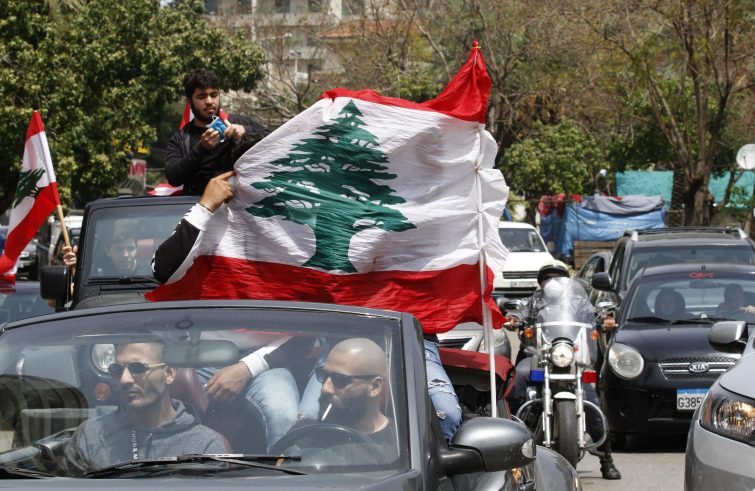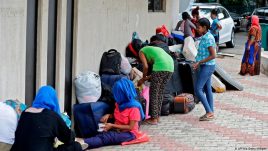
“We are facing a steadily deteriorating scenario. The Lebanese currency ( LPB) has lost its value – down by over 90% since 2019. Those who are fortunate enough to still have a paid job, including government jobs, can hardly afford to buy enough to live on. For example, those with a monthly income of $1,000 are now living on less than $50. Before the crisis, the poor were those without a job. Today, even the employed are coming to Caritas for help.
“Working from day to night is not enough to ensure a living. People live from day to day.”
Father Michel Abboud, president of Caritas Lebanon, thus described the recent events in the Land of the Cedars, which has been facing serious water, electricity, fuel and medicine shortages for weeks because there is no money to purchase raw materials. The economic crisis hit hard two years ago, and has been aggravated by the pandemic and US sanctions against neighbouring Syria. In addition, political decision-makers are unable to form a new government. Episodes of violence are increasing as social tension mounts, especially in the most impoverished areas of the country: incidents and clashes, even involving firearms, to gain precedence in the long queues at petrol stations, bakeries or water supply stations.
Electricity crisis. The shortage of fuel needed to operate the country’s power plants, generators and water pumps is a cause for growing concern. A first shipment is due to arrive next week from Iraq via the United Arab Emirates. The outgoing government in Beirut is negotiating the supply of electricity from Jordan through Syrian territory with Damascus, and the provision of natural gas with Egypt. For their part, the leaders of Hezbollah, the pro-Iranian Lebanese Shiite movement, announced that the first shipment of Iranian fuel oil will be setting sail for the port of Beirut. But the Government denied it, not least because of its commitment to respecting US sanctions on Lebanese imports of materials and products from Iran. Martin Griffiths, UN Secretary General for Humanitarian Affairs, and Emergency Relief Coordinator, announced on Wednesday that $10 million had been allocated to respond to the fuel crisis in Lebanon.
Food is the priority. Father Abboud’s thoughts go “to the many sick people who depend on respirators and intensive care for their survival. And I’m not just thinking of the COVID-19 patients. The ongoing power cut puts the lives of many of these patients at risk. Many have died as a direct consequence. There is also a shortage of medicines to treat chronic diseases such as diabetes. Milk for children is also in short supply. We at Caritas are trying to obtain it from abroad. We are also struggling to pay hospital fees and inpatient surgery. Public health facilities only cover part of the medical costs, not all. The remainder has to be paid by the patients, who are penniless.” “The emergency in Lebanon today – points out the Caritas president – is not providing psychological support but giving people food.
The priority is having enough food every day.
A proportion of people in Lebanon get by thanks to economic support from friends and relatives living abroad. Without it, they would be starving.”
- Volontari Caritas consegnano aiuti
- Volontari Caritas consegnano aiuti
- Volontari Caritas consegnano aiuti
- Volontari Caritas consegnano aiuti
- Volontari Caritas consegnano aiuti
Schools on the brink of disaster. Prospects for the coming months are just as bad, “maybe even worse than today.” Fuel shortages have resulted in rising petrol and diesel prices, preventing many from “reaching the workplace, receiving medical care and going to school.” “The new school year is scheduled to start on September 27, but nobody knows whether schools will reopen. The private schools, including Catholic ones, in the country, are facing great difficulties as families cannot afford to pay school fees because of the crisis,” said Father Abboud. Teachers have not been paid for months. We are working on a project to support schools, teachers and pupils with the Oeuvre d’Orient, a French charity that helps Christians in the Middle East. However, much support will be needed.”
COVID-19. Covid-19 is a bigger threat than the economic and financial crisis. “Cases of infection are growing daily,” said the Caritas president. We are worried about what will happen next fall, it is likely that the pandemic will claim more victims among the Lebanese people. There is a serious risk of new lockdowns. This – he explained – would cause all activities to come to a standstill, with devastating consequences for the economy, already in dire straits. As Caritas, we are planning to organise door-to-door food deliveries for all those in need. We are currently assisting approximately 53,000 families throughout Lebanon, but the number could increase in the future. We need help and we rely on our sister Churches, on the Italian Church, on benefactors around the world: we urge everyone not to forget Lebanon and the Lebanese people.”
“Our country is experiencing a massive emigration of young people and families who are leaving the country in search of a better future abroad,” he added.
It is estimated that more than 1,100 doctors and approximately 1,000 teachers have emigrated abroad over the past few months. This “exodus also includes numerous Christians, and it could jeopardise their presence in the country. Without Christians, Lebanon would lose a part of its charm, its very existence would be undermined. Lebanon needs Christians.”
Day by day. Despite everything, the Lebanese people are striving not to lose hope. Their hopes now rest on the formation of a new government that will guide Lebanon through the reforms required by the international community, necessary to activate the recovery program. “But if the political parties fail to reach an agreement,” the prelate said, “there is only one thing left to do: to live from hand to mouth.” “We are in a tunnel whose end is not visible,” concluded Father Abboud, “We need help to cultivate hope and help others. Food, medicine, money for hospitals and especially for schools.
In fact, this crisis cannot be overcome with bread alone, but also with books and education.
It is necessary to form the younger generation in Lebanon so that they may take the reins of their country and ensure a bright future”.
















